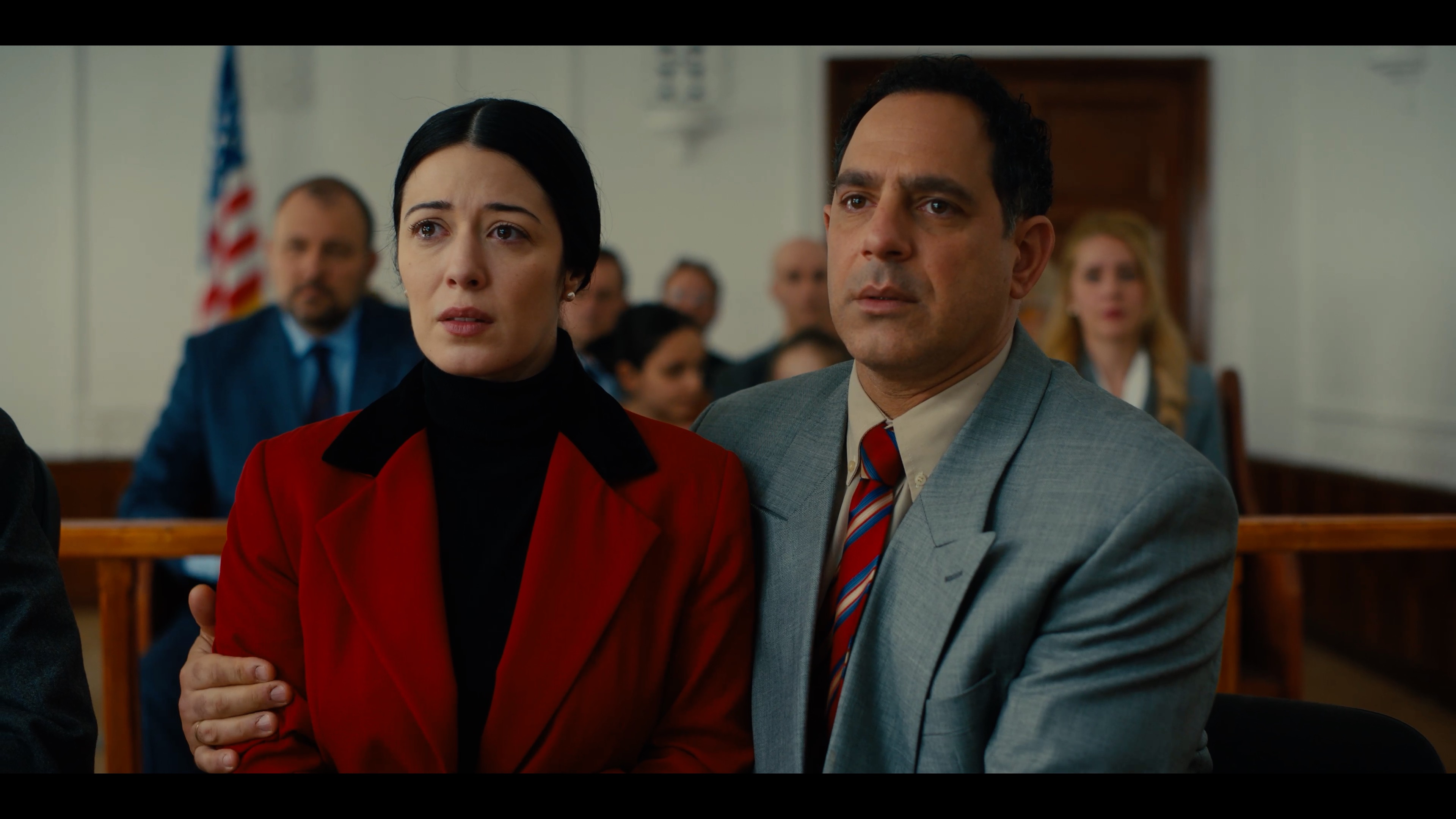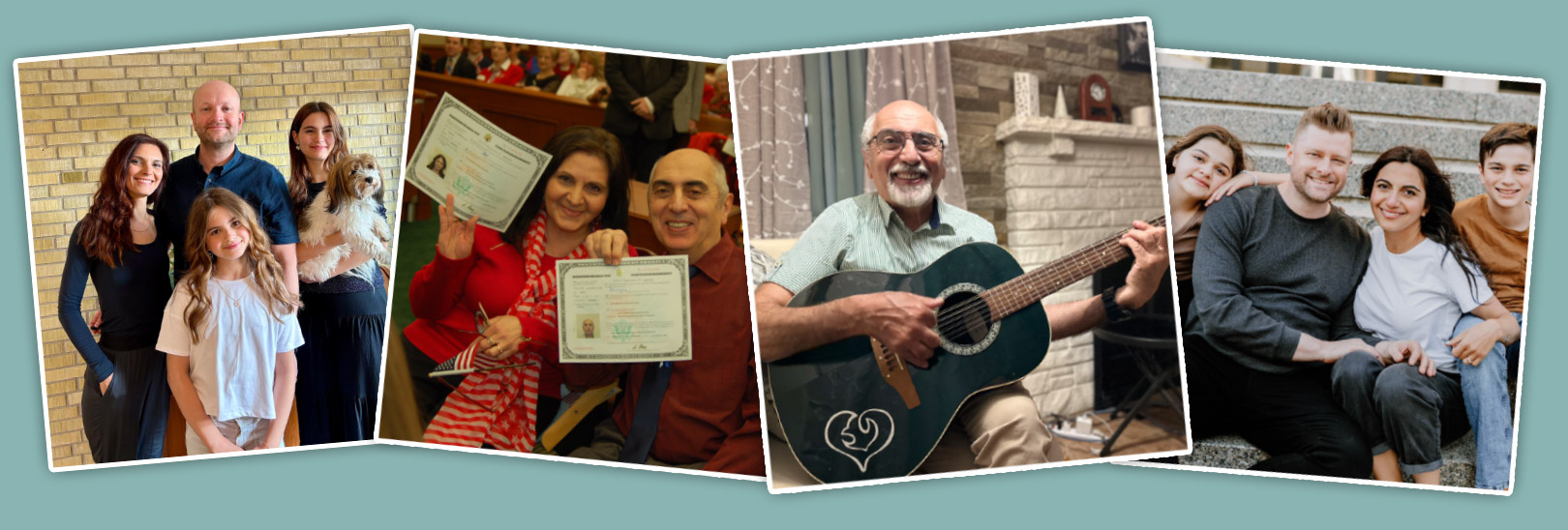In a crumbling Soviet Union, the Petrosyan family finds themselves as outcasts wherever they go. Their Armenian heritage marks them for discrimination, first in their home country of Azerbaijan and then in Russia. After finding their eternal hope through a church planted by American missionaries, the hostility of everyday life pushes them to seek refuge in the United States. In the shadow of exile, hope became their home.
Based on a riveting, true story of faith and hope, set amidst great oppression, "Between Borders" is only in theaters January 26-28.
Elizabeth Tabish, who stars in the new film as Violetta Petrosyan, is renowned for her portrayal of Mary Magdalene in "The Chosen." Her breakthrough role in "The Chosen" brought her widespread recognition and a dedicated fan base. Elizabeth is also an award-winning filmmaker.
(We invite you to listen to the conversation between Crystal Thornton and Elizabeth Tabish in the podcast below.)
Crystal: What drew you to playing the role of Violeta Petrosyan?
Elizabeth: "Just reading the script. When I met 'Between Borders' producer Isaac Norris at a conference, we were screening 'The Shift,' and afterwards he came up to me and he said, 'I have a script, and we've been wanting you to play this role.' I was curious. Then he mentioned that it's about an Armenian family. I immediately was like, 'Yes, I want to do this. I don't even need to read the script.' But it was so beautifully written. I'm part Armenian myself. So, I recognized my grandmother and great grandmother in a lot of these characters. It felt very familiar and I've never been able to play a character that's Armenian. It's rare that you see Armenians portrayed in movies. And so, the Armenian plight has just not been discussed often. So, I was very eager to help tell this story."

Crystal: The film is a timely considering the refugee crisis around the world, providing a human face to the statistics and fostering a deeper understanding of the challenges refugees face in seeking safety and stability. What do you want theatergoers to take away from the experience of seeing "Between Borders?"
Elizabeth: "Well, it depends on where they're at in the world. If you're watching it in America and you are an American, there's a good chance that someone in your family, great grandmother's, great-great-grandparents, they’re probably an immigrant. This country is this melting pot of so many different cultures and has been such a safe harbor for those who have needed refugee safety and status. I'm hoping that people can either recognize themselves or recognize their family in this story and those who are watching it from other countries, or who are going through anything, I hope they can find a sense of hope. The story, as much as it is about coming to America, it's also about them finding home in their relationship with God, a deeper security, and a deeper peace no matter where they are. I think that's a powerful message."
Crystal: The film beautifully captures the unwavering love of a family facing relentless persecution and their journey of faith and their pursuit of freedom. What is the message you want younger audiences to take away from it?
Elizabeth: "One, to realize how much your parents do for you. These parents both have these incredible jobs in Baku and Azerbaijan. Yvonne is literally a rocket scientist and Violetta is a principal of a school. They leave everything behind to protect their family and to make sure their daughters are going to be safe and survive. In Volgograd too, there's just so much bullying. There's so much name calling and there's constant threats to them. They just keep picking up and doing everything imaginable to make sure their family has a chance at a lovely and sweet life. You get to see what happens with them. It's just so wonderful. I think for younger audiences, to give them an opportunity to look at their parents, their grandparents, the generations before them, and everything they've done to give them a good life. It starts so young, but we must be kind to each other. We must be kind to those who look different from us, have different experiences from us, and come from different backgrounds. I think that you're never too young to learn to love each other. I think that's an important lesson in this film as well."

Crystal: What was the most difficult experience for you playing the role of Violeta?
Elizabeth: "Well, I wanted to make sure she liked it. The actual woman. I played Mary Magdalene in "The Chosen," and it is a real person from history, but there's no immediate feedback when you're doing it, right? But with this film, she's alive. Occasionally, she was on set, and you would think that would make me more nervous, but it just made the whole thing feel much more real. This is a real person that this happened to and it breaks your heart wide open, when you're telling this woman's story, and she's sitting across the room, and she has tears in her eyes, and you feel like you're getting to do something of service for someone to get to share her story with the world. And it's a real privilege. It's emotional. So, in that way, it's kind of hard. But it's so meaningful, and it's so wonderful."
Crystal: What is your God story, and have you always wanted to play in Christian centered movies?
Elizabeth: "I grew up Catholic. We had a small Lebanese Maronite Catholic church growing up. It was mostly, just my Lebanese side of my family, and that was special. I remember really being very involved. I went to Catholic school, then we moved to the Bible belt and there was something interesting that happened. I kind of lost a sense of community because I lost part of my culture. The Christian community and the Catholic community in Oklahoma were just so different from what I grew up with. It was just culturally so different and I felt so different. I never really understood why until looking back. It's probably because I'm part Middle Eastern and part Armenian, and all these things that I couldn't relate to with anyone else. Then growing up, there were some bad experiences with churches. I think there was a lot of exclusion. For example, if you don't go to this specific church, then you can't play with these certain friends. So, I lost a lot of friends when I didn't go to their specific church and there were some hurtful things at a really young age that kind of, I don't know if it turned me off from religion, but it certainly made me wonder, 'Well, if they're Christian, is this the type of Christian that Jesus wants us to be?' I never really felt like I belonged anytime I went to church. So, I just thought, 'Well, then I just don't go to church.' I pursued Christ in my heart, but not in a social or communal way. Then I'd say in my 20s, I just got cynical with the Catholic church, with things that were going on in it. I kind of got fed up with this hypocrisy that I was seeing. I think I was only seeing that, so that's not fair, but that's what was happening at the time. I just kind of got further and further away from any sense of what it is. I just got so cynical and so despairing about it all, skeptical too."
Playing Mary in "The Chosen":
"Over the last six or seven years, it's been this yearly and constant reminder of who Jesus really is and these incredible miracles, healings, and lessons."
So, there was about a decade where I just didn't know. I just had no idea. I thought, I want this, but every time I meet Christian people, they try to jam it down your throat, what their beliefs are, and that their beliefs are right and anything that differs from that is so wrong, and everyone's going to hell, and I don't like that. There's no way to engage with that. There's no way to grow from that when you're being attacked almost immediately. It took some time, and I almost wiped the slate clean and then "The Chosen" happened. Just reading the first episode, it was the Jesus that I missed. It was the Jesus that I remembered as a kid and it was so non-judgmental, loving, and personal. I remember just reading that scene on my bed, just crying and really feeling seen. This character (Mary Magdalene) too, to be able to recognize myself in this character, this type of lost despair. It was something pivotal for me. I think honestly, before even booking the role, it was just reading that scene. Then I booked it and I got to play out these beautiful scenes and over the last six or seven years, it's been this yearly and constant reminder of who Jesus really is and these incredible miracles, healings, and lessons. Where was this, this whole time? Why aren't we all talking about what Jesus did constantly instead of,' ‘You're wearing a skirt that's too short. You're going to Hell.’ Well, how about we talk about Jesus stopping everyone from throwing stones at a woman and saying, ‘He who is without sin cast the first stone.’ Why aren't we talking about that? That's what Christianity is. That's who Jesus is. So, I'm just fired up about how revolutionary and actually challenging being a Christian is and following Christ really is. Loving your enemies, turning the other cheek, and getting rid of your possessions. It's things that are kind of impossible to do and yet those are the things that he asks of us. So, it's a new love. It's a new enthusiasm for the reminders that we need of what this religion is. If it even is a religion or a church, it is this opportunity to go back to the gospels, to go back to what Jesus was saying, doing, and teaching, and following that, and being a follower of Christ, instead of ‘I go to this church.’ It's been kind of an eye-opening and wonderful thing for me, honestly.
You can see "Between Borders" starring Elizabeth Tabish in theaters January 26-28, 2025.
